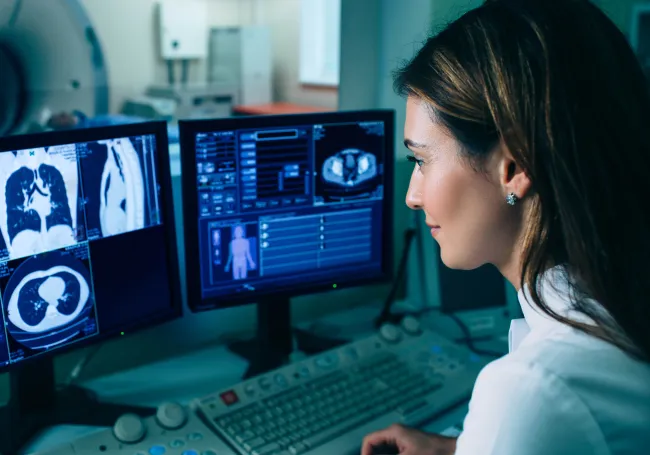Your Life Can Change in a Heartbeat
Coronary heart disease (CAD) is the leading cause of death among American adults. Half of these deaths occur suddenly, without prior symptoms or warning. However, if the risk factors leading to a heart attack are identified early enough, 85% of sudden heart attacks may be prevented.
Measure Your Risk In Minutes
Plaque inside the arteries of your heart can grow and restrict blood flow to the muscles of the heart. Plaque is made up of fats, cholesterol, calcium and other substances in the blood. It develops gradually over time, long before there are any signs or symptoms of disease. These deposits can restrict the flow of oxygen-rich blood to the muscles of the heart. Plaque also may burst, triggering a blood clot that can cause a heart attack.
Measuring calcified plaque with a Cardiac Calcium Screening can help predict heart disease risk at an early stage, before symptoms occur, for up to 10 years after the scan. The exam uses high resolution, rapid CT to take multiple angle X-Rays to create 2-D images of the beating heart. Our physicians analyze the CT to provide a calcium score for risk of cardiac artery blockage.
A Cardiac Calcium Screening requires an order from your doctor. Using your test results, your doctor will determine if you may need medication or lifestyle changes to reduce the risk of heart attack or other heart problems.

Why Is Early Detection Important?
The cardiac calcium exam determines the amount of atherosclerosis, or plaque build-up, in the coronary arteries, which is directly related to your risk for a future heart attack. Over time, plaque can cause hardening and narrowing of the arteries, decreasing blood flow to the heart.
Your physician orders a Calcium Cardiac Screening and will devise a comprehensive plan to minimize risk and maximize heart health after receiving the results. Early modification of risk factors, as well as drug therapy in some cases, can slow the progression of CAD.
Can you benefit from a Cardiac Calcium Screening?
Risk factors for developing CAD include:
- Age: men 45 or older, women 50 or older
- Sedentary or unhealthy lifestyle
- Family history of heart disease
- Abnormal cholesterol levels
- High blood pressure
- History of smoking
- Overweight
- Diabetes
*If one or more of these factors apply to you, talk with your doctor and consider screening.
**Patients with a known history of heart disease (coronary bypass or stent; implants including pacemakers or defibrillators; heart attack) or who are pregnant should not receive the exam.
Know Your Score
| Calcium Score |
Presence of Plaque | CAD Risk |
|---|---|---|
| 0 | No identifiable plaque | Low |
| 0-10 | Minimal plaque | Low |
| 11-100 | Mild plaque | Low to moderate |
| 101-400 | Moderate plaque | Moderate |
| Over 400 | Extensive plaque | High |
A low score suggests a low risk of coronary artery disease, but does not exclude the possibility of coronary artery narrowing. Discuss your results and how to decrease your risk with your physician.
The Value of Cardiac Calcium Screening
Physicians from Baptist Health South Florida explain the procedure and the benefits it provides to patients.
Frequently Asked Questions
Do I Need A Physician Referral?
Yes, a physician's order is needed for a Cardiac Calcium Scan. Your physician will review the results and decide if further testing or treatment is recommended.
What should I expect?
Before the scan begins, the technician attaches sensors, called electrodes, to your chest. These connect to an electrocardiogram (ECG or EKG), which records your heart activity during the exam and coordinates the timing of X-ray...
- Before the scan begins, the technician attaches sensors, called electrodes, to your chest. These connect to an electrocardiogram (ECG or EKG), which records your heart activity during the exam and coordinates the timing of X-ray pictures between heartbeats, when the heart muscles are relaxed.
- During the heart scan, you lie on your back on a movable table, which slides into the tubelike CT scanner. Your head is outside the scanner the whole time. The exam room will likely be cool.
- You may be prescribed medication by your doctor, that slows your heart. This helps ensure clear images. If you are nervous or anxious, you may be given medication to help you remain calm.
- You'll be asked to lie still and hold your breath for a few seconds while the pictures are taken. The technician operates the scanner from a room next door, but can see and talk to you the entire time. The entire procedure should take about 10 to 15 minutes.
How do I prepare for the test?
- Wear comfortable, loose-fitting clothing.
- Arrive 15 minutes prior to the scheduled test.
- Avoid stimulants (caffeinated food/beverages, nicotine, energy drinks) 4 hours prior to test.
